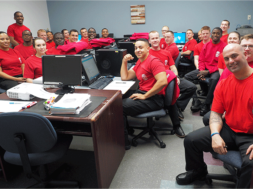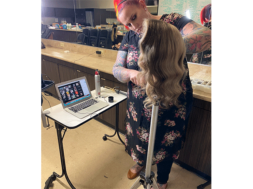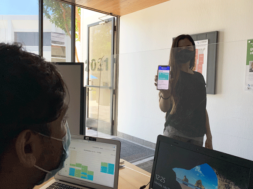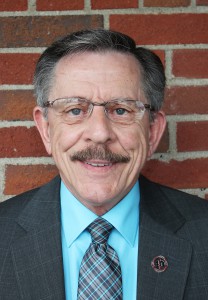
Ombudsmen can Resolve Issues Before Students Become Frustrated
Written by Barbara A. Schmitz from an interview by Jenny Faubert with Jim Klein, Ombudsman, Sullivan University
While Jim Klein’s official job title is university ombudsman, he really is a student advocate.
Sullivan University appointed Klein to its first ombudsman position in 2012, providing students and families with access to a high-level administrator to investigate and address, on an informal basis, complaints. Klein has been extremely effective in that position, resolving nearly 90 percent of all issues that come to his attention.
While department heads are expected to resolve issues and complaints, they are sometimes unsuccessful. Sullivan University created the ombudsman position, originally called the Director of Student Advocacy, in 2011, primarily to provide access to an experienced administrator when a problem occurred that could not be resolved by a department employee or manager.
“The goal of the ombudsman is to resolve issues before students become so frustrated that they just drop out of school or become terribly dissatisfied with their experience here,” he said.
Klein said it is inevitable that issues arise at any college or university.
“But how an institution handles those problems speaks to the true student centeredness of the institution’s philosophy,” he said.
Part of Sullivan University’s student centeredness is providing an advocate who fights for students and their rights. “The ombudsman has broad discretion to make whatever decision he or she deems is necessary to resolve a given problem to a mutually agreeable solution,” Klein said. “Before the position was ever created, it was recognized that broad authority had to be granted so the position was nearly on par with the CEO of the university to fix problems and issues that arise.”
In fact, as a senior member of the administration, Klein’s office is located in the administrative suite next to the provost and the CEO.
But while the ombudsman’s authority is significant, it would be rare for him or her to make academic changes such as grades. Rather, the ombudsman would consult with the department dean, director or the provost to attempt to arrive at a responsible solution that maintains the integrity of the academic requirements of the institution, Klein said.
Not just anyone should be an ombudsman, he added. For instance, it should not be a person who is judgmental or who comes to a conclusion quickly.
The right person needs a wise and sage demeanor to effectively deal with students, parents and others, Klein said. The person also needs the gravitas and authority to resolve issues without having to convince others of the efficacy of the decided-upon resolution.
Sullivan University has Long History
Founded in 1962 as a one-year business school, Sullivan University is known today as a reputable institution of higher learning, dedicated to providing educational enrichment opportunities for the intellectual, social and professional development of its students.
The private university offers career-focused curricula with increasing rigor from the certificate, diploma, associate, bachelor, master and doctoral degree levels. The Southern Association of Colleges and Schools Commission on Colleges accredits Sullivan to award associate, bachelor’s, master’s and doctorate degrees. Contact the Commission on Colleges at 1866 Southern Lane, Decatur, Georgia 30033-4097 or call 404-679-4500 for questions about the accreditation of Sullivan University.
Its main campus is located on approximately 15 acres in Louisville, Kentucky. A branch campus sits on a 10-acre wooded site in Lexington, Kentucky, while an extension campus is located on the U.S. military installation at Fort Knox. Although it’s not a physical facility, the university also provides a stable, functional online platform. In fact, a growing number of Sullivan University’s degrees, certificates and diplomas are available fully online.
A successful ombudsman should also have a long tenure with the company, which ensures that he or she also has a deep and wide knowledge about the institution as a whole, Klein said. That longevity ensures the ombudsman knows prior policies and practices that he or she can apply to situations as necessary.
Klein said successful ombudsmen must also be highly skilled at investigational work and be able to see through the extraneous facts and materials that often surround situations, allowing them to see the root issue and needs. In addition, ombudsmen must be patient and diplomatic, authoritative and kind, always ensuring every person, regardless of circumstances, receives the respect commensurate with the inherent worth and dignity due every human being, he said.
“While not necessarily required, a fatherly or motherly presence is helpful when dealing with young students, as well as other parents with whom he or she can relate and with whom other parents often feel comfortable speaking to,” he said. “Finding the perfect person for this role is a tall order for sure. If done properly, the person can take so many challenging and difficult situations and turn them around into a win-win situation for all.”
Klein said the ombudsman is responsible for investigating and resolving issues and complaints that come to his or her attention informally from active or former students or others. The ombudsman speaks with parents and students and/or reviews written correspondence to those who complain or express concerns regarding their encounters with the university. The ombudsman must conduct research to find the root cause of the problem and, when appropriate, find alternate solutions and/or information. Lastly, he or she must make independent decisions to rectify problems and concerns.
Students can come directly to the ombudsman with issues, or faculty and staff can refer situations to them. “But the majority of the time, the student will come directly to me,” Klein said. “I usually get involved immediately when a situation is brought to my attention.”
Klein said he regularly and consistently takes the time to meet with students, thoroughly research their situations, and nine out of 10 times, can resolve their situations to the mutual satisfaction of the students and the university.
For example, Klein said he met with a former student last fall whose account was in collection due to a balance owed. “She needed an official transcript sent to another school and we had recently provided her with an unofficial transcript, but we would not provide the official transcript as long as she owed the balance due,” he said. Her daughter was with her and very argumentative about the whole situation, but after a lengthy discussion, the woman agreed to pay her balance by the end of the week.
“While she wasn’t happy about having to pay her balance, she did give me a hug and I sent her off with a cold Pepsi that I had bought for her and a smile,” Klein said. “By the way, she did pay her balance. But the best part of the story is that her very outspoken daughter graduated with her associate degree from a local community college this past December and enrolled this past January in Sullivan’s bachelor’s degree program in management.”
Ombudsman Jim Klein from A Hutchings on Vimeo.
Another time, a student who was enrolled in Sullivan’s culinary arts associate degree program and who had already earned a bachelor’s degree in food service at Purdue University, was upset to learn that she wouldn’t graduate when she expected because she hadn’t completed a composition course required by Sullivan but not required by Purdue. “I pulled her transcript for Purdue and after studying it at length noticed that she had completed … undergraduate thesis honors courses,” Klein said. After sharing his findings with the registrar, they agreed the student would have completed a lot of writing in those two courses so they were able to award her credit for the missing composition course. “She was a happy camper and graduated at the end of that term,” Klein said.
But complaints can be about anything or everything. “It may be a financial aid problem,” he said. “It may be a student services situation. It may be a situation in housing. It may be a situation in enrollment services. It could be an admissions problem. You really need to know everything.”
The process is similar when dealing with parent situations or complaints. “Fortunately, my relaxed, friendly, but sometimes boldly honest approach allows me to quickly develop a parent-to-parent relationship with parents who may be upset,” he said. “But it also allows me to adopt somewhat of a parent-child relationship with the very young students who expect and demand the unreasonable.
Klein said it’s no surprise that an ombudsman is usually better able to resolve situations, rather than going through a complex and sometimes time consuming complaint process that must be carefully documented and recorded to satisfy federal requirements.
“Sullivan University has a clear and substantial formal complaint process that is sometimes utilized by current or former students,” he said. “It is very structured and somewhat bureaucratic. The process can get dragged out and the student can get tired of waiting. But if an issue can be resolved to everyone’s satisfaction informally, everyone wins and a great deal of time and energy is saved. That is time a student could be putting toward his or her studies.”
In addition, many students are intimidated at the thought of embarking on a formal process, he said. However, if the ombudsman can’t solve a problem, a student still can file a formal complaint at any time, Klein added.
Klein said he’s never heard of a student not wanting to go through the ombudsman or being too shy to go to the ombudsman. “I’ve been around here for so many years and I’m the friendliest person to talk to,” he said. “A lot of the students learn from other students that they should talk to me when they have a problem.”
Besides resolving situations promptly, Klein also serves as the lead administrator and coordinator for all new and returning student registration activities, as well as chairman of the Undergraduate Admissions Committee.
Jim Klein at a glance
- Since February 2012, Klein has served as university ombudsman at Sullivan University, responsible for investigating and resolving complaints from active and former students.
- From April 2006-February 2012, he served as Sullivan’s director of enrollment services/registrar’s office, where he supervised the registrar, associate registrars, enrollment service specialists and others; was responsible for entry, maintenance and accuracy of student enrollment records; served as the lead administrator for all new and returning student registration activities; and more.
- From April 1985-April 2006, Klein worked at Sullivan as director of the Evening Division where he was responsible for compilation, editing and submission of the evening/weekend course schedule; conducted the evening weekend new student and new faculty orientations; and more.
- From February 1977-April 1985, he was an Evening Division admissions officer where he procured and followed up on prospective student referrals; managed all inquiries; conducted interviews and tours with prospective students; and more.
- Klein graduated from Sullivan University in March 1967 with a diploma in business accounting and management. As a student, he served as president of student government for two years and was captain of Sullivan’s first national championship basketball team in 1967.
- He received Sullivan’s Distinguished Alumni Award in 2001 and the Veterans I.M.A.G.E Award in 2011.
- Klein is a Vietnam-era veteran (U.S. Army) and a Purple Heart recipient.
Contact Jim Klein at jklein@sullivan.edu or 502-413-8524.
“I make decisions on acceptance to the university,” he said. “I review daily internal scholarship requests and make decisions on approval and forward authorization to the finance and planning department for addition to the student account. I also evaluate and process quarterly academic suspension appeals and recommend approval or denial when the students request to return.”
The main advantage of an ombudsman is that they allow schools to solve small issues or problems before they become large.
“At Sullivan, this approach has resolved numerous issues where students have threatened to withdraw, where students have threatened to file complaints with the Better Business Bureau or the attorney general, and where parents have threatened to smear the operations of the institution to their local high schools and social circles,” Klein said. “Mistakes and issues happen and arise. Sometimes it’s the student or parent’s fault and sometimes, admittedly, it is the institution’s fault.
“But being able to resolve matters quickly to a mutually satisfying end improves retention as well as the image of the institution in the public’s eye,” he said. “This is the value of having the right person in an ombudsman student advocate role.”
It’s also very rewarding to resolve a situation and leave both sides smiling, he said. In fact, that’s his favorite part of the job.
Klein encourages other universities to considering appointing an ombudsman who has the knowledge, demeanor and authority to meet with aggrieved parents, students and others to resolve issues when department heads fail to do so. “Mistakes happen and we need somebody to fix them,” he said.
But to be effective, an ombudsman must have the authority to make decisions him or herself, he stressed. “I hardly ever need to go to Dr. Marr and ask ‘what you think about this’?” Klein said. “If I ask him, nearly every time he’ll say “do what you think is right and I’ll support you.”
Dr. Jay D. Marr, CEO of Sullivan University, said it’s easy to believe an ombudsman will make the right decision when you have the right person in the job.
“Sullivan University is fortunate to have a 40-plus year employee in the role who knows the university inside and out and who has demonstrated over the years care and concern for both students and the institution,” he said. “Mr. Klein has a unique ability to see both the forest and the trees, and his investigative skills are second to none as is his ability to de-complicate some of the most complex situations that ever arise. In addition, Klein’s ‘fatherly’ demeanor allows him to speak to students in a way that helps them understand where they may be asking for too much or are being unreasonable without coming off as offensive or patronizing.
“This same personal gravitas allows him to connect well with parents who see him as a parental peer with working with their sons and daughters,” Marr said. “Simply, Sullivan University is blessed to have Jim Klein as ombudsman. His personality, skills and good judgment make him the best student advocate we could ever possibly imagine.”
Written by Barbara A. Schmitz from an interview by Jenny Faubert.











